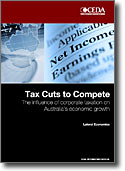Which taxes should Australia cut to get the fastest possible economic growth? Company taxes, says this CEDA information paper.
Report highlights
Cutting company tax appears to offer the most effective means of spurring economic growth through tax cuts. It should be brought back onto the agenda of public discussion for policy makers and commentators.
This is the lesson from both recent economic theory and from results in high-performing economies such as Ireland. In particular, economic analysis over recent years has made a very strong case that lower company tax rates will drive increased investment, particularly foreign investment. In contrast, cuts to personal income tax rates will drive a small increase in economic growth, particularly if those cuts go to higher income earners. (This is set out in CEDA's previous information paper, Tax Cuts for Growth.)
The CEDA report also finds that Australia could fund substantial company tax cuts by abolishing its system of dividend imputation. Abolishing dividend imputation could fund a company tax rate of as low as 19 per cent, making a major contribution to economic growth without requiring spending cuts or tax increases elsewhere in the economy.
CEDA's view
CEDA acting chief executive Greg Meek says the report explores how Australia can make itself most attractive to international investors.
"The race for international capital is one area where Australia really does compete with other nations," he says. "Australia needs to keep finding better ways to win this race."
About the report
The report's principal author is Dr Nicholas Gruen, who runs economics consultancy Lateral Economics and is a Visiting Fellow at the ANU and the University of Melbourne. He has held senior positions with the Business Council of Australia and on the Productivity Commission and was economic advisor to Treasurer John Dawkins in the early 1990s.